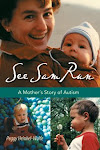I'm fond of telling my kids that their grandkids will be in awe of their childhood experiences -- all of what a computer couldn't do, how crude a smartphone was, how brutal medical practices seemed (that last idea comes courtesy of Star Trek IV The Voyage Home).
I tried to apply that perspective to all kinds of situations in raising Sam. Being aware that you are in pioneering territory is helpful. Lots of people have come before us to do the Lewis and Clark equivalent of defining the landscape of accommodating someone with a disability and laying the groundwork with the public policy that opened up this new frontier of living with a disability.
I try to remember this journey as the Wolfe family Conestoga wagon settling the autism frontier. Nearly every day something new, something without precedent. Sometimes it's exhilarating. Sometimes the risks are clear and present. And always, always, exhausting.
The pioneering days of speech therapy are behind us. If someone in the discipline was interested in a exit interview, I have things to say about what worked and what didn't. I would imagine Sam does, too.
Never was that more clear than when I read the following line in Diane Ackerman's book, One Hundred Names for Love (a book about her husband's stroke and continuing recovery from aphasia, which has some interesting similarities to Sam's speech impairment). She describes a scene where her husband, Paul West, also an imaginative writer, struggles with fill-in-the-blank worksheets meant to help him regain his ability to talk.
"Choosing the correct answer could be as tough as herding cats. But, like most people, I did know the accepted answer. Selecting it, I had to ignore all other answers that spring to mind or were truer to my experience."
Correct is not the same as accepted.
Furthermore, we cannot ascribe too much meaning when a client cannot come up with the accepted answer.
I tried to explain that in my book, when I relayed Sam's experience of confronting vocabulary cards with images of things he'd never seen before. Diane absolutely knocked it out of the park, explaining the inherent social context of many speech exercises.
I think it could be a much bigger problem than those working in speech therapy might realize.
Throughout the book she describes "deliciously ambiguious words" and takes us on verbal joy rides with them. She sprinkles phrases without context and then gives us a fun house worth of perspectives to show how much we depend on context for meaning.
I wish I knew that two decades ago. I can only imagine how much better his speech therapy would have been. I wish I knew that a month ago when we were hit again with this problem.
I wish I knew these things I never knew I was waiting for.
Subscribe to:
Post Comments (Atom)






No comments:
Post a Comment